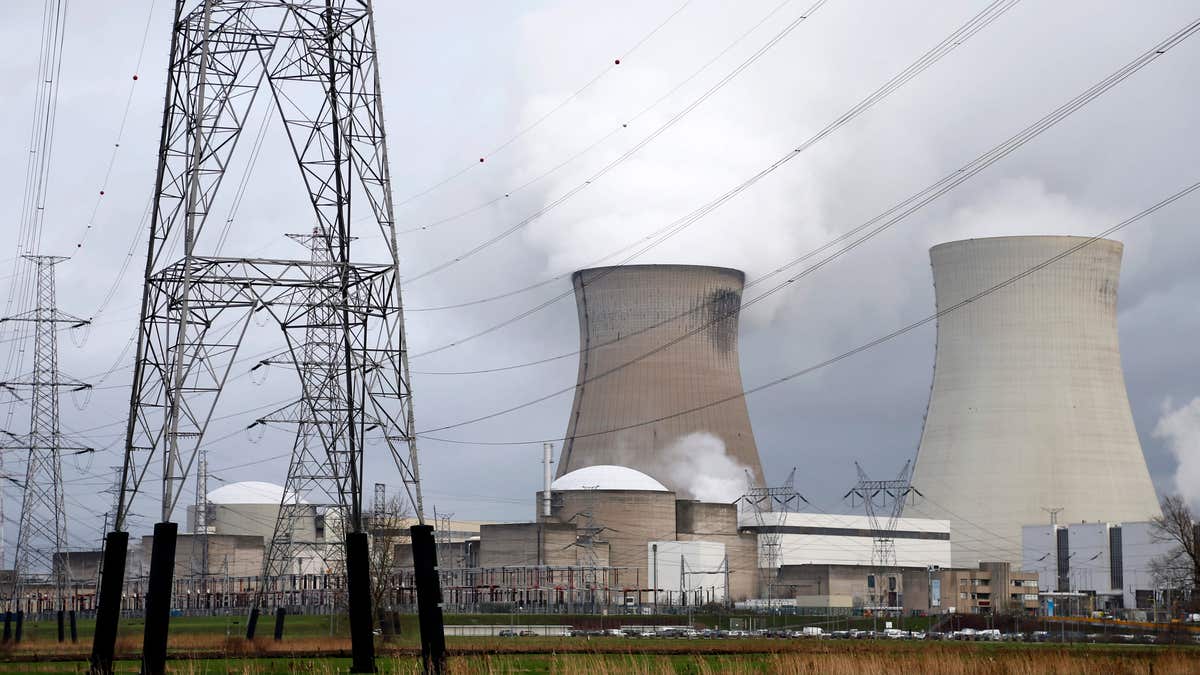
Jan. 4, 2016: High-voltage power lines are seen next to cooling towers of Doel's nuclear plant of Electrabel, the Belgian unit of French company Engie, former GDF Suez, in Doel near Antwerp, Belgium (Reuters)
The investigation into Monday’s suicide bombings at a Brussels airport and a Metro station is reportedly prompting fears that the Islamic State is looking to obtain nuclear material and is increasing concerns about security at Belgium’s nuclear faciilities.
Belgium’s nuclear agency said earlier Friday it withdrew the entry badges of some staff and denied access to other people recently amid concerns that the next terror attack could take place at one of the facilities. Employees were sent home hours after the attacks in Brussels.
The New York Times reported that surveillance footage of a top official at a separate site was found last year in the apartment of a terror suspect linked to the extremists who carried out the atrocities in Paris in November.
Belgian media reported this week that two of the suicide bombers in the Brussels attacks, brothers Ibrahim and Khalid El Bakraoui, had video of the home of a senior official at the Mol nuclear waste facility in the Flanders region.
British Defense Secretary Michael Fallon expressed his concerns about ISIS getting its hands on a nuclear weapon. When asked, Fallon said that “was a new and emerging threat,” according to the New York Times.
Sebastien Berg, a spokesman for Belgium’s federal agency, told the Times that their fears lie on several fronts, including “exploding a bomb inside the plant” or “flying something into the plant from the outside.” That could potentially stop the cooling process of used fuel and shut down the plant, Berg said.
According to the New York Times, Belgium has already had its issues with security at its plants. The nuclear agency’s computer network was hacked this year and was shut down briefly. Three years ago, two people were able to jump a fence surrounding a reactor in Mol, break into a lab and steal equipment. And in 2012, two nuclear employees defected from Belgium to join jihadists in Syria and eventually pledged their allegiance to ISIS.
One of the former employees died fighting in Syria, but Pieter Van Oestaeyen, a researcher who tracks terror networks in Belgium, told the New York Times the other man was convicted on terror charges in Belgium in 2014 and had been released last year.
Another incident reportedly occurred in 2014 when another unknown individual turned a valve on a reactor and drained 65,000 liters of oil used to lubricate turbines. The damage was so extensive it shut down the reactor for five months. Authorities are investigating possible links between that incident and terror groups.
“This was a deliberate act to take down the nuclear reactor, and a very good way to do it,” Berg told the Times.
The incidents are now being seen in a different way after the attacks in Brussels Monday and the anti-terror raids across Paris and Brussels in the last few days after the bombings.
Experts told the newspaper that obtaining any of the nuclear material from Belgium’s reactors would be a tough grab without alerting law enforcement. Even a dirty bomb threat is low because radioactive waste is incredibly toxic and would likely sicken or kill the people trying to obtain it rather quickly, the Times reported.
Belgium has both low and high enriched uranium. Officials in the nuclear field told the Times that the discovery of surveillance footage of a top nuclear official has sparked concerns that a terror group could kidnap a nuclear scientist and force them to help them obtain nuclear materials.
The Associated Press contributed to this report.








































